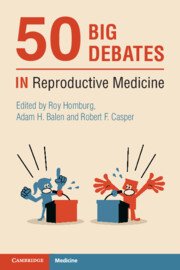Book contents
- 50 Big Debates in Reproductive Medicine
- Series page
- 50 Big Debates in Reproductive Medicine
- Copyright page
- Contents
- Contributors
- Foreword
- Introduction
- Section I Limits for IVF
- Section II IVF Add-ons
- 5A DHEA Is an Effective Treatment for Poor Responders
- 5B DHEA Is an Effective Treatment for Poor Responders
- 6A The Addition of LH/hCG to FSH Improves IVF Outcome
- 6B The Addition of LH/hCG to FSH Improves IVF Outcome
- 7A Acupuncture Is a Useful Adjuvant for Fertility Treatment
- 7B Acupuncture Is a Useful Adjuvant for Fertility Treatment
- 8A There Is a Role for Pre-conceptional Treatment with CoQ10
- 8B There Is a Role for Pre-conceptional Treatment with CoQ10
- 9A There Is a Role for Pre-conceptional Treatment with Vitamin D
- 9B There Is a Role for Pre-conception Treatment with Vitamin D
- 10A Natural Killer Cell Assay in the Blood Is a Useless Investigation
- 10B Natural Killer Cell Assay in the Blood Is a Useless Investigation
- 11A Intralipid Therapy Has a Place in Infertility Treatment
- 11B Intralipid Therapy Has a Place in Infertility Treatment
- 12A The Endometrial Scratch Has Had Its Day
- 12B The Endometrial Scratch Has Had Its Day
- 13A Corticosteroid Therapy Is Useful in Assisting Implantation
- 13B Corticosteroid Therapy Is Useful in Assisting Implantation
- Section III The Best Policy
- Section IV Embryology
- Section V Ethics and Statistics
- Section VI Male-factor Infertility
- Section VII Genetics
- Section VIII Ovarian Stimulation
- Section IX Hormones and the Environment
- Index
- References
11B - Intralipid Therapy Has a Place in Infertility Treatment
Against
from Section II - IVF Add-ons
Published online by Cambridge University Press: 25 November 2021
- 50 Big Debates in Reproductive Medicine
- Series page
- 50 Big Debates in Reproductive Medicine
- Copyright page
- Contents
- Contributors
- Foreword
- Introduction
- Section I Limits for IVF
- Section II IVF Add-ons
- 5A DHEA Is an Effective Treatment for Poor Responders
- 5B DHEA Is an Effective Treatment for Poor Responders
- 6A The Addition of LH/hCG to FSH Improves IVF Outcome
- 6B The Addition of LH/hCG to FSH Improves IVF Outcome
- 7A Acupuncture Is a Useful Adjuvant for Fertility Treatment
- 7B Acupuncture Is a Useful Adjuvant for Fertility Treatment
- 8A There Is a Role for Pre-conceptional Treatment with CoQ10
- 8B There Is a Role for Pre-conceptional Treatment with CoQ10
- 9A There Is a Role for Pre-conceptional Treatment with Vitamin D
- 9B There Is a Role for Pre-conception Treatment with Vitamin D
- 10A Natural Killer Cell Assay in the Blood Is a Useless Investigation
- 10B Natural Killer Cell Assay in the Blood Is a Useless Investigation
- 11A Intralipid Therapy Has a Place in Infertility Treatment
- 11B Intralipid Therapy Has a Place in Infertility Treatment
- 12A The Endometrial Scratch Has Had Its Day
- 12B The Endometrial Scratch Has Had Its Day
- 13A Corticosteroid Therapy Is Useful in Assisting Implantation
- 13B Corticosteroid Therapy Is Useful in Assisting Implantation
- Section III The Best Policy
- Section IV Embryology
- Section V Ethics and Statistics
- Section VI Male-factor Infertility
- Section VII Genetics
- Section VIII Ovarian Stimulation
- Section IX Hormones and the Environment
- Index
- References
Summary
Intralipid infusion is seen as a popular supplemental option to treat implantation failure or recurrent miscarriage. It is a good example of how hype preceded scientific validation. Intralipid is a fat emulsion that is essentially used as parenteral nutrition. Following the observation that the infusion of Intralipid may modulate the expression of NK cells, its use began in the treatment of implantation failure in IVF treatment. Its adoption into clinical practice was not dissimilar to many other unproven treatments that become popular because they are available and considered to be low risk. However, Intralipid seems to have escaped any rigorous randomised controlled trial (RCT). Despite a demonstrable lack of efficacy in observational data, and two low-powered RCTs, it continues to be used in practice. In the interest of maintaining scientific credibility, the use of Intralipid should be restricted only in the realms of research.
- Type
- Chapter
- Information
- 50 Big Debates in Reproductive Medicine , pp. 59 - 61Publisher: Cambridge University PressPrint publication year: 2021



